Why Azure Cognitive Search Is the Future of Intelligent Search?
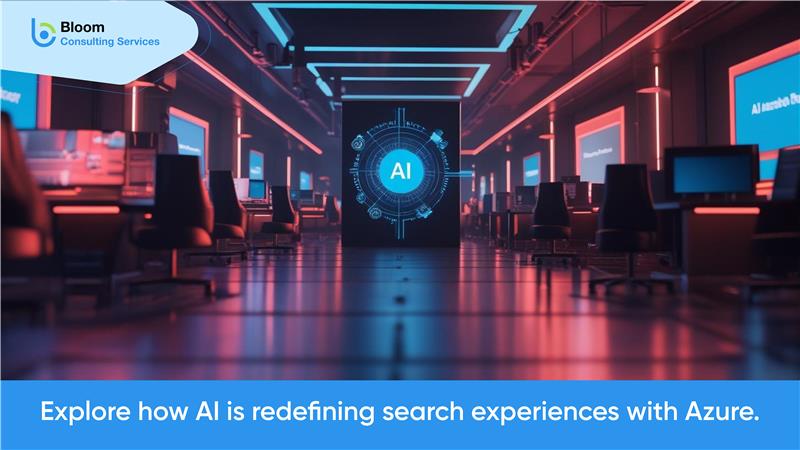
In times when data is growing at an exponential pace, finding relevant information quickly and accurately has become a strategic edge. Azure Cognitive Search, on the other hand, is becoming an intelligent search solution for the future to transform how businesses extract insights from complicated data sources.
Unlike traditional keyword-based search engines, Azure AI-powered search brings together cutting-edge AI capabilities such as natural language processing, semantic ranking, image recognition, and language translation to find intelligent, context-aware results in real-time.
With the strength of the Microsoft Azure cloud platform, Cognitive Search by Azure lets organizations enrich raw content with AI-powered skills, aiming at making unstructured data searchable and actionable. Whether it be for customer support systems, enterprise portals, e-commerce, or knowledge mining, more personalized and context-relevant user experiences can be crafted with it. Support for structured, unstructured, and semi-structured data means it basically adapts to any enterprise requirements-from the smallest startup to a global enterprise.
With smarter decision-making and automation taking precedence, AI-enhanced search is witnessing growing demand. The Semantic search in Azure stands out by promoting a fully managed, customizable, and secure search solution that seamlessly integrates with other Azure services. Fast, intelligent, and scalable search experiences are what place it right at the forefront of enterprise search in a data-driven world.
Table of Contents
What is Azure Cognitive Search?
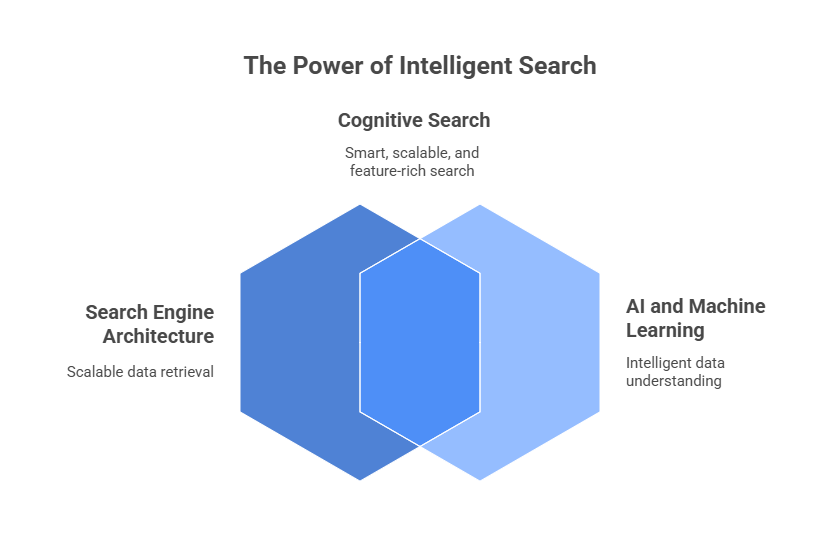
Azure Search Services, rebranded as Azure AI Search, is shaping newer ways through which organizations implement intelligent search across varied applications. With data increasingly becoming the driving element of businesses, getting accurate, relevant, and contextual information from large and diverse sources has become paramount. To serve this, Azure Cognitive Search amalgamates an extremely strong search engine architecture with advanced AI and machine learning capabilities to create a perfect alchemy for developers to create feature-rich, scalable, and smart search experiences.
At its heart, Microsoft Azure Search is a cloud-based search-as-a-service solution that allows one to bring content in from structured, unstructured, and semi-structured data sources and turn it into a fully indexed and searchable dataset. Something that makes it unique from traditional search solutions is the very deep integration of artificial intelligence-they don’t just match keywords, they understand intent, recognize patterns, and interpret context to really accurately target results. This makes it excellent for applications where intelligent data exploration is paramount, be it enterprise knowledge bases, e-commerce catalogs, document management systems, or even AI-chatbots.
AI-Driven Intelligence for Good Search Accuracy
One of the highlight features that makes Azure Cognitive Search famous is its AI enrichment pipeline. In indexing content, raw content is treated with various cognitive skills to either recognize key phrases, translate languages, identify objects in images, or detect sentiment. The resultant enriched metadata is then stored alongside the content in the index, which ensures that the search is highly relevant. For instance, a search for “quarterly earnings” would intelligently prioritize text documents, scanned PDFs, images having embedded text, and commentary with sentiment analysis.
Powerful Indexing Engine
Azure Cognitive Search provides full-text, vector, and hybrid search capabilities over the user-defined index. The developer defines the schema for the search index, which includes various fields, filters, analyzers, scoring profiles, and synonyms. This high degree of customization ensures that the search engine will precisely target the need of the application, thus whether it involves searching across medical records, financial statements, or multilingual product catalogs. Moreover, the platform provides that one can perform quite complex transformations upon indexing so that content may be optimized for discoverability and relevance to end users.
Talk to an Azure AI Expert
Scalable, Flexible, and Secure
In considering scalability, hybrid data solutions come into play, and Azure Cognitive Search is built to accommodate them. You can scale it both down and up depending on the size and complexity of your data, accommodate small application instances, and enterprise-grade deployment pipelines. It also has built-in security with features such as data encryption, private endpoints, and role-based access controls, to name a few, which are especially advantageous for organizations with compliance requirements like healthcare, finance, and government offices.
Integration with Azure Ecosystem
Another excellent reason for the usage of Azure Cognitive Search is the seamless integration into the other Azure services. Azure Cognitive Search operates closely with Azure Cognitive Services for the more advanced tasks that entail voice-to-text, understanding language, and image recognition. It pairs with Azure Machine Learning for building custom ML models, and with Azure OpenAI for bringing in generative AI functionalities. This level of interoperability proves to greatly ease the process of building a highly sophisticated AI-driven application for developers instead of having multiple platforms and tools around.
Allowing For RAG-Based Applications
With the rise of large language models (LLMs), the role of Azure Cognitive Search becomes vital in Retrieval-Augmented Generation (RAG). RAG is a system that enhances LLM responses by providing relevant grounded data. Acting as the retrieval part, it ensures that generative AI models pull data from trusted and updated sources that lead to more precise and well-contextual answers. This capability is immensely helpful for customer support bots, internal knowledge assistants, or real-time decision-making systems.
Semantic and Generative Search Capabilities
Cognitive Search in Azure supports semantic search, unlike traditional search engines that engage with keyword matching. Semantic search employs deep learning models to understand the actual meaning behind words and queries and thus produce more relevant results even if the words used to express the meaning are different. For example, a simple query like “treatment for high blood pressure” could correctly match documents containing the words “hypertension therapy.” Exceeding simple keyword lookup will present a good search experience for users, which is much more user-friendly and useful.
Further, the platform serves as a meeting point between traditional and generative search paradigms. In the traditional sense, Azure Cognitive Services Search facilitates document lookup, catalog search, and file browsing. But in the context of modern applications, it transforms into federal support for intelligent assistants to generate summaries, answer questions, and even initiate workflows from context-rich data mined from indexed content.
Understanding Azure Search VS Cognitive Search
The landscape of enterprise search is morphing rapidly, and the cloud-based service from Microsoft has undergone multiple name changes to keep up with all its capabilities. It started with Azure Search, a rather straightforward cloud-based hosted search; it evolved into Azure Cognitive Search and, as of October 2023, has been officially renamed Azure AI Search. Each subsequent nomenclature indicates the deeper integration of artificial intelligence (AI) and machine learning (ML) into the service, meaning it is far from a mere search engine.
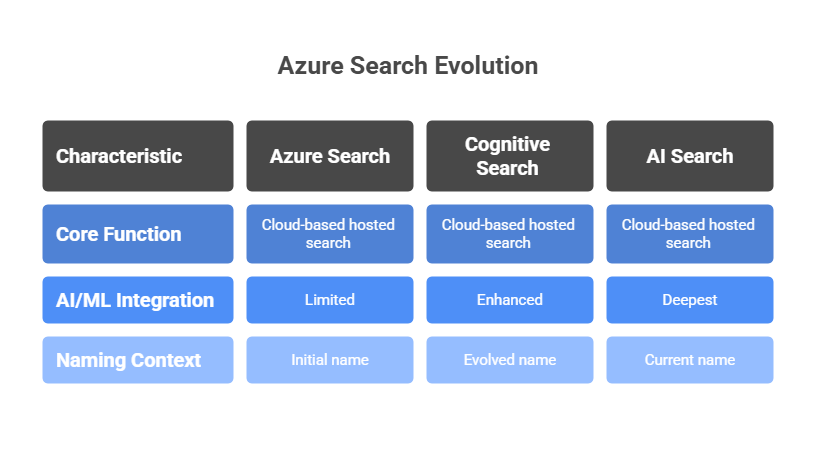
From Azure Search to Azure Cognitive Search
Originally launched as Azure Search, the platform gave developers a scalable, fully managed search service for building rich search experiences into their web and mobile applications. The service would create and manage search indexes and allow for full-text search, filtering, faceting, and ranking. In its power, its methods were primarily keyword-based searches with very little intelligence in the searches.
The October 2019 rebranding to Azure Cognitive Search signified a giant leap toward the integration of cognitive skills. These skills are AI that enriches content during the indexing process. This integration meant that the service could extract key phrases, identify languages, analyze sentiment, recognize entities, and interpret the content of images through the use of built-in AI models or through an integration of their own. This highlighted the shift from strictly keyword-based searches to intelligent search were meaning behind the data could be conveyed.
Explore AI Solutions Now
Azure AI Search: The Latest Evolution
Microsoft adopted another name change in 2023 in the wake of the rise of generative AI and large language models (LLMs) and named it Azure AI Search. Then, it was able to make the service a more obvious fit into the broader Azure AI ecosystem, which also comprises Azure OpenAI Service, Azure Machine Learning, and Azure Cognitive Services. While the names have changed many times, this did not change the foundation for the majority of the Azure Search features: indexing, querying, filtering, and ranking. What has constantly evolved throughout its time is the intelligence built on top of these operations.
Core Functionality Stays Consistent
Across all its versions, the core value proposition of Cognitive search engine has remained consistent: providing a fully managed, scalable search-as-a-service that simplifies the complexity of search infrastructure. It allows developers to ingest content from various sources, documents, databases, web pages, and media, and index it in a way that makes it fast and easy to search. It supports a wide array of data types and enables custom indexing logic, scoring profiles, and search result tuning.
What has changed over time is how this platform processes, understands, and presents data using AI. With the cognitive or AI label, the service no longer just finds matching terms; it interprets user intent, enriches documents automatically, and even integrates with generative AI models to deliver relevant answers grounded in your own enterprise data.
AI-Enhanced Capabilities: What Sets It Apart
It was the AI enhancements that distinguished Azure’s Cognitive Search from other cloud search services. Its pipeline supports AI enrichment, and, thereby, allows users to apply pre-trained models or custom cognitive skills during the indexing phase. The following capabilities are made possible:
- Natural Language Processing (NLP): The search engine understands a certain context and can identify synonyms and linguistic nuances and hence produce very accurate and relevant results.
- Semantic Search: Computation in semantic search looks beyond exact word matching: it interprets the meaning of queries and documents, hence creating a significant improvement in accuracy.
- Content Enrichment: Metadata extraction, identification of entities, automatic generation of summaries, and classification of content all take place via AI during indexing.
- Personalization: Search experiences can be adapted to a particular user based on their behavior and preferences-and sometimes based on their geographic location.
A Practical Example
The following example seems illustrative of what happens in the real world with these functionalities. If one were to search for the string “best coffee shop near me,” generic keyword-matching results would list documents containing the words “coffee” and “shop,” irrespective of relevance or location. Microsoft Cognitive Search, however, especially when integrated with location-based data and NLP, understands “near me” as referring to the present location of the user. Hence, it can produce nearby results for actual coffee shops even if they are just named and not described by using the keywords “coffee” or “shop.” This speaking intent and context is a showcase of AI in the search.
How Is Azure Cognitive Search Useful for Business?
Today’s world sees organizations generating vast piles of data each day; making that data searchable and actionable is a mountain increasingly difficult to climb. Azure AI Search allows smart, scalable AI-powered search and rich indexing for businesses that want to glean meaningful insight on structured and unstructured content. Converting raw data into searchable knowledge allows companies to boost internal productivity, create better customer experiences, and automate mission-critical operations.
1. Employee Productivity and Decision-Making Enhancement
Cognitive Search allows employees to find key information in emails, PDFs, reports, or databases quickly. Through AI features such as key phrase extraction and sentiment analysis, users are provided contextually relevant information rather than mere keyword matching. This supports decision-making and cuts the time taken to search for reference materials across disparate systems drastically.
2. Uncover Insights from Unstructured Data
Most enterprise data lies in an unstructured format, which includes scanned images, handwritten notes, audio files, and emails. Azure AI Search uses several AI enrichment capabilities like OCR, language detection, and entity extraction to convert them into searchable content. In this way, businesses can extract valuable clues that were once locked away in non-digital formats.
3. Creates Smart and Personalized Customer Experiences
Customer fronts such as e-commerce stores, knowledge bases, or support portals can use AI-powered intelligent search. Azure Cognitive Search offers a personalized, fast, and highly intuitive search interface that includes autocomplete, filtering, and semantic ranking. This enables customers to get their queries resolved swiftly, boosting satisfaction and conversion.
4. Powers Intelligent Chatbots and Virtual Assistants
By indexing internal documentation, policies, FAQs, and support tickets, Cognitive Search from Azure enables chatbots and virtual agents to perform real-time knowledge retrieval. Integrated with large language models and RAG (Retrieval-Augmented Generation) systems, this provides a basis for accurate and contextually meaningful responses to user queries, thereby enhancing customer support and reducing workload for support teams.
5. Automates Classification and Extraction of Metadata
Manual classification is time-consuming and error-prone. It helps automate metadata extraction during indexing using cognitive skills to identify metadata such as names, dates, totals, or categories. The enriched structured results are fed directly into dashboards, reports, or analytics tools without requiring manual tagging.
6. Grows as Your Business Grows
It offers scalability depending on whether you’re dealing with thousands or millions of documents. Cognitive Search powered by Azure supports a horizontal scale, high availability, and a geo-distributed index through its cloud-native architecture. It can work well for small teams and hefty enterprise applications with strong requirements under high loads.
7. Keeps Informed About Data Security and Regulatory Compliance
Azure Cognitive Search has security and encryption built at every layer, including one at the transition. RBAC-building applications, private networking, and integration with Azure Active Directory make it fit well in applications that operate in regulated environments like healthcare, finance, and legal.
8. Facilitates Multilingual and Location-Aware Search
With built-in support for language detection and translation, Azure AI-driven Search fosters multilingual indexing and search. It also offers personalization of results based on user behavior, preference, or location to make sure it is relevant to a wide-ranging set of user groups and international markets.
9. Facilitates the Integration of Azure AI and ML Services
It is tightly integrated with Azure OpenAI, Azure Cognitive Services, and Azure Machine Learning. This ecosystem integration enables companies to build smart workflows, from data ingestion and enrichment to semantic search and generative AI-powered applications, without tearing from third-party solutions.
10. Supports Full-Text Search, Semantic Search, and Vector Search
Traditional keyword search, semantic search, and vector search are advanced models supported by Azure capability. Semantic search helps with user intent understanding, while vector search facilitates similarity matching amid big datasets. These features are indispensable in media, legal, research, and clinical spheres where understanding relationships and meaning is critical.
The Future of Azure Cognitive Search: Intelligent, Integrated, and AI-Driven
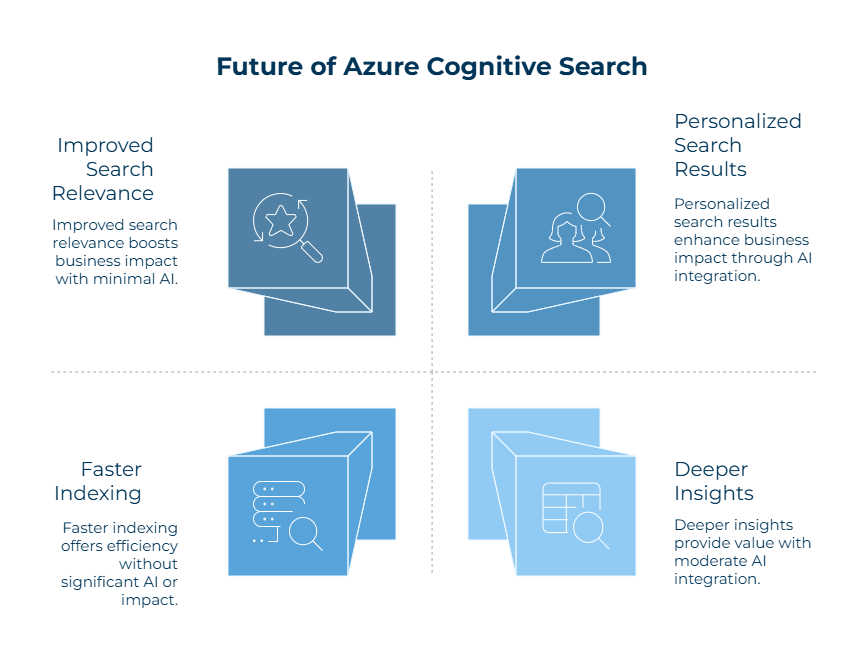
As enterprises automate their data pipelines and mine ever-increasing amounts of structured and unstructured data, search is no longer about just matching keywords. It should be about being contextually aware and presenting an intelligent interface delivering real-time, personalized results. The transformation is at the very heart of Azure Cognitive Search-theoretically called Azure AI Search. It is fast evolving beyond a standard enterprise search engine into a full-stack AI-powered search that tightly integrates into the Azure AI ecosystem.
In the coming years, Azure AI-powered Search will witness continuous upgrades that include integration with AI, scaling, data enrichment, and developer usability. Below, we explore successive trends and features defining its future as well as why it is fast evolving to become the bedrock of intelligent search experiences.
AI Enrichment will Be Commonplace
One of the most powerful features of this AI-powered Search by Azure is the AI enrichment pipeline. The search engines could only search for exact matches of words. With newer data types and evolving user expectations, however, the need for deeper knowledge consideration and smarter indexing arose.
Leveraging Azure Cognitive Services such as Text Analytics, Language Understanding, Form Recognizer, and Computer Vision, Azure Cognitive Search will continue serving as an extractor of metadata and hidden insights within data. These AI skills are capable of identifying the language, sentiment, keyphrases, entities, and visual contents within images or PDFs at the time of indexing.
In the coming years, the enrichment pipeline is expected to become all the more intelligent, automated, and customizable. Developer(s) may thus train their domain-specific model through Azure Machine Learning or use a third-party model as a custom skill within the enrichment pipeline. This enables industries to extract industry-specific insights like legal clauses, medical terms, or financial metrics from any given document.
Such an evolution in intelligent content transformation will empower companies to find their documents faster and understand their actual meaning and value in real-time.
Generative AI Could Bring a New Meaning to Search
Arguably, the most significant trend in shaping the future of Azure-Powered Cognitive Search is its heavy integration with generative AI, especially via the Azure OpenAI Service. By bringing together enterprise data with large language models (LLMs) such as GPT-4, companies can now start enabling Retrieval-Augmented Generation (RAG) workflows.
Here’s how: Azure Cognitive Search indexes the enterprise’s internal documents and responds to a query by surfacing the most relevant content. The relevant content is then passed to an LLM to engineer an entirely grounded, human-like response that cites source materials. Users are, therefore, able to ask elaborate open-ended questions and receive grounded and explicit answers based on their organization’s knowledge base.
This RAG pattern has use cases across industries:
- Customer support: A contextual response should be generated considering ticket history or an FAQ document.
- Employee knowledge portals: Provides fast answers to queries related to HR, IT, or policies with some assistance from Artificial Intelligence.”
- Legal research: Summarize laws or regulations from case files and legislation databases.
As generative AI grows, Azure Cognitive Search will become even more versatile as the retrieval layer in intelligent conversational systems, generating dynamic, personalized, and explainable AI responses.
Hybrid Search Will Deliver the Best of Both Worlds
Search platforms traditionally worked under either paradigm: full-text keyword search, which is fast but shallow, or semantic search, which is deep but slow. Azure Cognitive Search is at the forefront of the hybrid model that combines the two approaches, offering faster, nuanced, and highly relevant results.
In this hybrid approach:
- In any keyword search, we look for exact matches, and traditional scoring is implemented in those situations to make them more precise.
- Semantic search brings in the meaning by analyzing the intent behind the query and then matching it to contextually related content.
- Vector search allows for an approximate match between query embeddings and document embeddings, even when they differ with respect to terms.
From a hybrid search perspective, this pipeline offers users a user interface proffered for the outright keyword search with deep semantic knowledge feature and vector-based recommendation method. It presents an integrated user experience. Developed for applications in complex fields such as scientific investigation, law, healthcare, and finance wherein domain-specific terminologies can vary, it crucially incorporates matching user intent with deep content.
Advanced Data Handling and Source Integration
Supporting different and complex data sources is deemed to be one of the most vital strengths. Often, organizations have data scattered across databases, document repositories, file storage, APIs, and other external systems. Azure Cognitive Search offers ingestion of data through data connectors and Azure Data Factory for both structured data (SQL, Cosmos DB) and unstructured data (PDFs, Office docs, images).
In the future, with even more seamless integration into data:
- Low-code/no-code data ingestion tools
- Real-time streaming index updates
- Graph connectors for knowledge networks
- Deeper support for third-party SaaS systems
The data can be aligned across departments into a common set of indexes by a business; thus, enterprise-wide search experiences will remain relevant, contextual, and always up to date.
Agentic Retrieval Will Power Conversational Context and Planning
One of the major Azure AI Search roadmap disruptions is widely thought to be agentic retrieval, an altogether new framework bringing intelligent query planning and execution into the RAG pipeline.
Here’s how it works:
- The system understands the conversation history and user context.
- It then relies on dynamic selection for the most relevant kind of search strategy (keyword vs. semantic vs. vector, etc.).
- A task-oriented “agent” plan to orchestrate sub-queries that draw conclusions from multiple sources.
- Custom models and logic are applied to process and validate the final output carefully.
This agentic approach thereby ensures the system acts more like a thinking assistant rather than a mere search engine: it can perform multi-step actions, adjust its internal logic depending on how complex the query becomes it just has to, and launch secondary lookups if the confidence in the primary one drops too low.
This is a game-changing functionality for AI copilots, research assistants, and enterprise chatbots that need to maintain conversational awareness and precision at scale.
Real-World Use Cases and Industry Applications
The actual power of Azure Cognitive Search lies in its application across industries to solve genuine business problems. As companies find themselves facing more and more diversified and complex types of data, the intelligent search platform of Azure establishes the infrastructure for building solutions that are fast, scalable, and AI-driven. From streamlining internal operations to creating exponential customer engagements, the versatility of the Azure toolbox becomes a profitable tool across verticals.
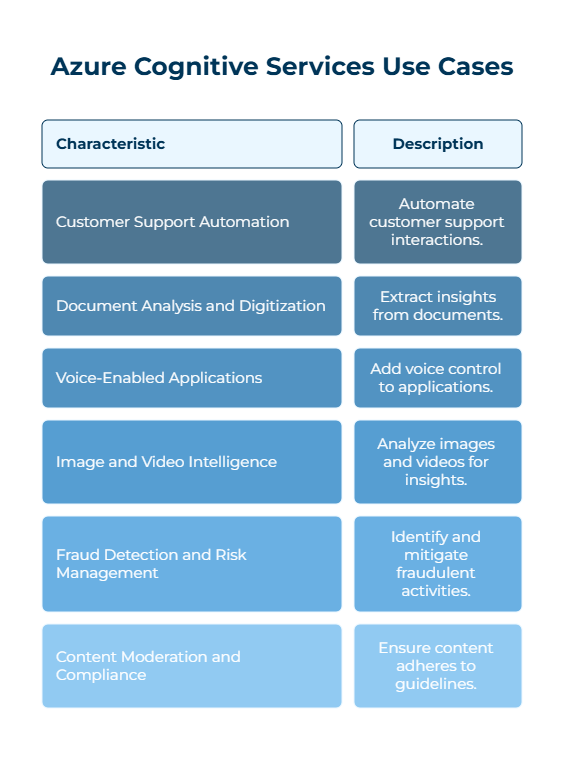
Healthcare
In the healthcare industry, quick and secure access to information is paramount. Hospitals and research organizations use Cognitive Search from Azure to index enormous volumes of unstructured data, such as patient records, medical imaging notes, and academic publications. Solve entities, recognition, OCR, or semantic search help doctors and researchers gather the required information even though it may have been buried deep in handwritten files or PDFs. The system also identifies PHI data automatically and handles it in compliance with regulations such as HIPAA.
Legal and Compliance
Legal and compliance organizations deal with a massive influx of contracts, case files, regulatory documents, and so forth. Azure Cognitive Search powers intelligent legal discovery searches across vast repositories. Law professionals can use plain language to perform searches, and the system returns relevant results, taking into consideration the legal language, clauses, and context. Through incremental enrichment and semantic ranking, related documents can be identified even if the terms used differ. This frees up invaluable time for legal research and compliance auditing to be done faster and more accurately.
Retail and E-Commerce
Retailers use search to allow their conversions and customer satisfaction. Search in Azure Cognitive gives power to intelligent search bars and product discovery engines, handling complicated customer inquiries like “summer jackets under 5,000 INR in blue.” It offers autocomplete, filtering, semantic relevance, and vector similarity features to develop the most personal shopping experience. It also aids retailers with image-based searches using AI skills to index product images and their visual attributes.
Financial Services
In banking and financial services, real-time insights are required on-going meeting different types of content, policies, transaction records, risk models, and compliance reports. Azure Cognitive Search is used to create secure internal portals that allow analysts and compliance officers to source information within seconds. This system detects anomalies, extracts financial entities, and surfaces documents relevant for audits or a fraud investigation. Using Azure OpenAI, banks are also using intelligent assistants to answer customer questions with real-time data pulled through RAG pipelines.
Education and Knowledge Management
Azure-powered Cognitive Search is used by educational institutions, research organizations, and publishers to build knowledge portals, which allow end-users to perform searches across books, papers, lecture notes, and digital content. Semantic- and vector-based search empower students and teachers to drill down into a topic finding content that is conceptually related but not based on specific keywords. AI-based summarization and translation are also given to make content more accessible across the languages and reading levels.
Conclusion
As search moves from mere keyword matching toward intelligent AI-driven discovery, Azure-driven Cognitive Search is at the leading edge of this transformation. Its seamless integration with Azure AI services; support for hybrid and semantic search; and secure scaling across industries make it a crucial platform for modern organizations. Azure Cognitive Search thus ensures that the data of any organization is converted into useful information quite fast and with far more efficiency, powering generative AI applications, internal knowledge systems, and improving customer experiences. In this AI-driven world, it is not just about searching anymore; it is about searching and understanding.
If you’re looking to explore more about how Microsoft’s Azure Cognitive Services can add value to your business, including practical examples and pricing details, don’t miss our detailed guide on Azure Cognitive Services Pricing and Examples. It will help you better understand the full scope of Microsoft’s AI capabilities beyond search or, you can simply visit us here.
Frequently Asked Questions
What is Azure Cognitive Search used for?
As noted above, very often important bits of information get stuck in unstructured files like PDFs, Word documents, and slide decks. It allows companies to index and search for such contents so that they can find whatever they need quickly and accurately.
What happened to Azure Cognitive Search?
In October 2019, Azure Search was renamed Azure Cognitive Search to emphasize the integration of AI and cognitive skills into search tasks, albeit that these remained optional. Then, in October 2023, it was renamed Azure AI Search to better align with the broader family of Azure AI services and emphasize its presence within the AI world led by Microsoft.
What is an example of a cognitive search?
Consider an instance: with a specific user inquiry, cognitive search gives a hard-hitting, direct answer. Broader topics, on the other hand, pave the way for more detailed responses. As cognitive search keeps recording interactions and learning from those interactions, the service grows its accuracy in delivering more relevant results.
What is an example of a cognitive search?
A user providing a specific question, for instance, would expect cognitive search to provide a focused and concise response. However, a broader query would result in a relatively comprehensive answer. As it keeps track of user interactions and learns from them, the system grows more accurate over time and begins providing highly relevant and personalized results.



